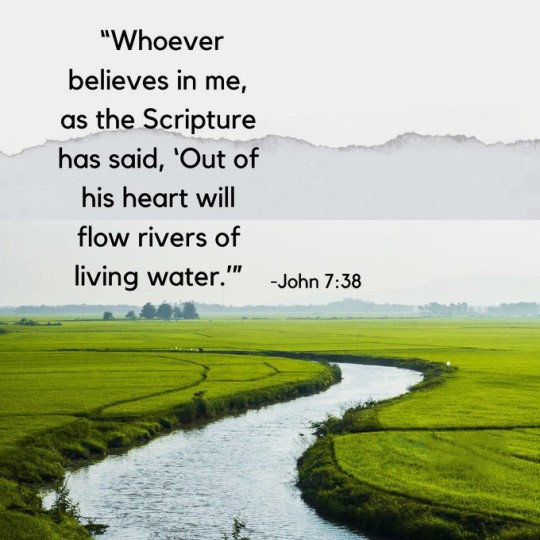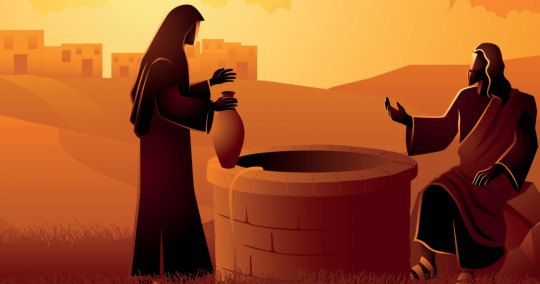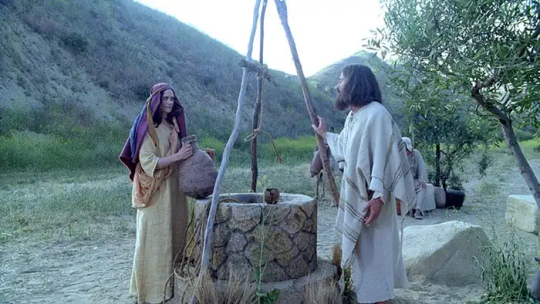#living water
Text

John 7:38 (NKJV) -
He who believes in Me, as the Scripture has said, out of his heart will flow rivers of living water.”
90 notes
·
View notes
Text
So often in myth there's a quest to find the Water of Life hidden away in some obscure Fountain of Youth or Tuck Everlasting-style pool. And it'll be this closely guarded secret that only a few people ever know about: a finite resource.
But what's so beautiful is that in Narnia, there's a whole ocean of it. The Water of Life is boundless and infinite. It's all you can see in every direction. You are literally floating in it.
#i say it fits the mythological Water of Life archetype bc the old men begin to grow younger#a sea of grace#and it tastes like light#living water#fresh water#not salt#not from a well#pure drinkable water and it changes you and there's an /ocean/ of it#it will never run dry#i could wax poetic about the sweet water in narnia forever#and the connection with living water#ahhhhhhhhhhhh#Narnia#into light#pontifications and creations
252 notes
·
View notes
Text
Navigating Living Waters
Affirmation has a Facebook group titled Living Waters, which is for LGBTQ people, family, & friends who are active in the LDS church. This group is meant to be a place to discuss issues and topics from a believing LDS perspective.
At the 2023 Affirmation International Conference, I was asked to be the presenter for the Living Waters session.
Church can be challenging for queer people and for those who love us as things get said which hurt. I wanted to help people feel like they have some skills they can use when they encounter these situations. For that reason, I called my session “Navigating Living Waters - Affirming ourselves and drawing boundaries as we navigate life at church and with believers.”
I’m sharing my presentation in the hopes it may be useful to some who were unable to attend the conference.
————————————————————
"We're not gonna become someone we love by talking to ourselves like we're someone we hate. We're not gonna become the best version of ourselves while treating ourselves like someone who deserves to be punished just for existing. I know it's hard, but have your own back” - Dr. Glenn Patrick Doyle
A big part of what makes church hard for queer people is we repeatedly receive negative and rejecting messages about this part of who we are. Research shows both our mental & physical health are negatively affected as we internalize these messages. How can we handle things when this happens?
It depends on the situation. For example, if a comment is made in Sunday School, we can also make a comment, but Sacrament meeting isn’t interactive. It also depends on you. If you're not out to everyone in the room, then speaking up may not be an option you would choose. Some people's personalities are more introvert or extrovert. Some people have anxiety. There's a lot of variables.
We need to push back against those messages of negativity and discrimination. It's a way of honoring myself. Pushing back may include speaking up, or it may mean replacing those messages to myself with affirming ones.
This past week at my therapy session, I was speaking with my psychologist about an assignment where I identify something I did that day for which I feel accomplished and then say that I'm proud of myself for doing this thing. I told the therapist that it feels hokey. I understand what I'm writing, but I don't feel it. She said while typing or writing are fine, for the brain it's more effective to hear the words spoken. And it's even more powerful to look at my reflection in the mirror and say the words to me. Giving voice to an affirmation has power.
I share that because it’s good to write thoughts to yourself. It’s even better if you’re able to give voice to those thoughts.
If you find yourself in a place where things are being said, but you can’t speak up, one option is to remove yourself from the space. If it's Sacrament Mtg and the speaker is saying things that are hard for you, get up and walk out. You don't have to make a big deal about it, you can quietly slip away. Although, I have seen someone who got up and walked out while making clear they were unhappy with what was being said by making an exasperated noise and shaking their head.
If I’m watching General Conference with family or friends and can’t turn it off, there’s several options available. I can get on my phone to distract myself and check out what people are saying on Twitter and on Tumblr. I could take a bathroom break. If I’m taking notes, I can start writing affirming, positive messages to myself to counter the words being spoken.
Pushing back against and replacing the rejecting messages is a way to not internalize them.
Let's say we're in a classroom situation and something discriminatory is said about queer people. Many of us choose to be silent, to be passive and let the comment go unchallenged. At church it seems like we’re socialized to not make other people feel uncomfortable even as they are saying things which are hurting us. We don't have to let the comment go unchallenged, but you have to weigh whether the situation is one where you can safely push back.
We don't want to respond with violence or threats, we don't want to dehumanize the other person, we don't want to inflict trauma on them. If we do that, then for many, our voice loses its legitimacy. We can be affirming of ourselves without demeaning others. We're taught to do unto others as we want done to ourselves, so let's respond in a way that treats others how we deserve to be treated.
We want to challenge their ideas and assumptions. We want to make them aware of other experiences and ways of thinking. We want to point out the negative messages they are conveying.
It helps if we assume they have good intentions and didn’t realize what they said could be understood in a way that hurt others. We are trusting that we can reach their humanity.
We can respond by building on common ground.
We can use “I” statements to share our feelings and our experience. "I" statements can begin with “My experience is…,” or “I think…” It’s hard for someone to argue that you don’t have those experiences, thoughts or feelings. When we open up and make ourselves vulnerable, usually others will react positively and they let down their guard, too.
Let me give you an example. Let's say we're in Sunday School class and the topic is prophets. Someone in the class says “I’m happy for the guidance of prophets because thanks to them we have the Proclamation which tells us what a true family looks like.”
<Gulp> Do I let that slide?
Here's one way I could respond. Remember, I'm looking to build on common ground and use "I" statements.
“I’m also glad for prophets and the hope they give us, but it’s important to think of how things like the Proclamation apply to our own situation. The Proclamation speaks of ideals but not everyone's lives fit those. I have friends who are single parents and it’s important they know that God loves their families, too.”
Another example is, "I am glad for prophets and as a queer person, I've been noticing them more and more teaching that we need to include and love everyone. While the Proclamation contains ideals that work for your family, I read it and wonder ‘Where do I fit in? What is God's purpose for my life?’”
I built on the common ground of prophets, but then I pivoted.
By speaking up, you're inviting everyone in the room to consider this point of view which they may not have considered. Maybe they have never imagined how the Proclamation may be hurtful to people in different situations.
Another approach is to appeal to a gospel principle, like “Love your neighbor.”
Let me share a few comments that can be used in a variety of situations.
“I don’t know about that, but what I do know is I’m supposed to love my neighbor. If I have to choose, I’d rather err on the side of being too loving than of not being loving enough.”
“My experience is these are real people with real feelings. If anyone in this room is part of the queer community, I want you to know you’re loved. God loves you and I love you.”
"The church's Handbook says all are to be welcomed and treated with kindness, and so I’m going to follow that advice.”
These phrases challenge the narrative that was being put forward and makes clear that not everyone agrees with what was being said. It shows there’s more than one way to think about these things. For anyone who might be in the closet or who has friends or family members who are queer, they will now know you’re a safe person to talk to.
I have one friend who, when the teacher asks, "What is something evil that people call good?" she will raise her hand and blurt out "homophobia!" She doesn't wait to get called on because by going first, she sets the standard. She says when she gives this answer, usually every hand lowers. They all were going to say something like gay marriage or being trans or something like that. Now the other class members can't give their answer because they don't want to be seen as doing exactly what has just been called out as an evil.
————————————————————
At this point, I asked them to pair up into groups of 2 or 3 and I gave them a list of possible comments they might hear. I asked them to practice responding. It’s a safe space and they can get feedback and retry. When they do experience a situation where they want to respond to a comment, they’ll have this experience.
Here’s the comments I gave them to respond to:
A man says he wishes that as a kid he’d heard of being transgender, because he would’ve used that to get into the girls’ locker room
A person saying it’s abuse when parents allow a transgender person to transition
When a person says they’re disgusted by affection shown between a same-gender couple
A parent says she’s uncomfortable having a lesbian as her child’s Primary teacher
Being told we should not identify as gay
Being told they love and accept us, but don’t tell anyone else you’re bi
LGBTQ+ people are that way because of bad parenting, or sexual assault, or something they saw on TV
Children deserve a mother and a father
Gay people are loved less by God because they persist in living a sinful life
————————————————————
Here's another suggestion to hopefully stop these types of negative comments from happening in the first place. If you see that the topic for an upcoming class may have the possibility for anti-LGBTQ comments to be made, you can contact the teacher about your concerns.
"Hi. I noticed this week's Come Follow Me includes some verses people may use to say unkind things about LGBTQ people, and I was wondering if you've thought of that and how you might keep that from happening, or how you could respond if it does happen?"
Let's say the class is assigned a conference talk that has anti-queer things said in it. You could contact the teacher and volunteer to share some of your thoughts with the class and see if the teacher agrees to that. Be ready to share what you’d like to say as it will help the teacher feel comfortable accepting your offer. For example, I might share this in a class:
“The church is imperfect. In this mortal world, that is how it is. But one thing I’ve learned is that there’s more room for me in the plan of salvation than there is in the closet. The messages I get from God are wonderful and I wish the church and my orientation were more compatible because I don't feel like I'm incompatible with God. The past few decades have shown the church is on a trajectory to be more inclusive and understanding, and that gives me hope. I know we're reading the words of an apostle, and I won't challenge what he is saying, he has every right to teach these things, but I know in my heart that the way I feel when I hear these words is lesser than, like I'm excluded, and I don't feel that way with God. I'm choosing to be here for the hope I find here and the good things church does in my life. Thank you for letting me share my perspective.”
Okay, so we talked about several strategies.
You can remove yourself from the space where negative things are being said.
You can choose to think or write affirming messages to replace the ones you are hearing.
You can make a comment to affirm yourself.
You can preemptively contact the teacher.
—————————
The other topic I’m addressing today is boundaries. It’s okay to draw boundaries, you don’t have to share everything just because someone asked. I have family I love but they view being queer differently from me, and so for the sake of our relationship it helps for me to have some boundaries.
The purpose of a boundary is to keep ourselves safe, to do that we draw boundaries around the mental, physical, behavioral and spiritual aspects of our lives.
While I think people understand the reasons for having boundaries, sometimes the hard part is knowing how to state the boundary. I’m passing out a handout with a number of phrases that may be useful. These are suggestions, hopefully they’ll spark ideas of additional phrases you can use.
I appreciate the gesture, but in the future I'd prefer...
I'm not prepared to discuss this any longer. Let’s take a break so I can collect my thoughts
Thank you for your concern about my child's behavior, I'll take it from here
That question is too personal. I won't be answering it
I feel undermined when you bring this up in front of everyone. Next time, please talk to me about it in private
I would appreciate it if you didn’t talk to my mom about my private life
Thank you for your opinion, but I’m confident in my opinion
Why would you ask me that, does that seem appropriate? Would you be comfortable answering such personal questions about your life?
This isn’t a productive conversation. I’m not responding any more
I appreciate you asking, but that information is readily available on Google. I suggest you start there
Remember, this is not a negotiation, we aren't discussing where the boundaries should be. You're letting them know what your boundaries are.
I don't know if it's particular to our culture, but it seems Latter-day Saints regularly say and ask about topics that maybe they shouldn't, especially if they don't know you well. If they try to continue on after you've expressed your boundary, you restate the boundary
I appreciate your concern, but as I said, I'm not prepared to discuss this any longer
I've politely asked not to discuss XYZ, if you do again then I will...(leave, end this conversation, ask to be transferred, speak with the Relief Society president, etc)
—————————
As a queer person, or as someone who loves a queer person, church can be complicated, yet there are a lot of reasons why someone chooses to continue to engage with church. I hope that you leave today’s session feeling like you have some methods that will help as you navigate these spaces.
24 notes
·
View notes
Text

Jesus and the Samaritan Woman
8 (For his disciples were gone away to the city to buy meat.) 9 Then said the woman of Samaria to him, How is it that you, being a Jew, ask drink of me, which am a woman of Samaria? for the Jews have no dealings with the Samaritans. 10 Jesus answered and said to her, If you knew the gift of God, and who it is that said to you, Give me to drink; you would have asked of him, and he would have given you living water. 11 The woman said to him, Sir, you have nothing to draw with, and the well is deep: from where then have you that living water? 12 Are you greater than our father Jacob, which gave us the well, and drank thereof himself, and his children, and his cattle? 13 Jesus answered and said to her, Whoever drinks of this water shall thirst again: 14 But whoever drinks of the water that I shall give him shall never thirst; but the water that I shall give him shall be in him a well of water springing up into everlasting life.
15 The woman said to him, Sir, give me this water, that I thirst not, neither come here to draw. 16 Jesus said to her, Go, call your husband, and come here.
— John 4:8-16 | American King James Version (AKJV)
The American King James Version is Produced by Stone Engelbrite. It is a simple word for modern word update from the King James English.
Cross References: Ezra 4:3; Ezra 4:11; Song of Solomon 4:15; Isaiah 12:3; Isaiah 55:1; Isaiah 58:11; Jeremiah 2:13; John 2:2; John 4:5-6; John 4:20; John 6:34-35; John 7:37
#Jesus#Samaritan woman#well#drink#everlasting life#living water#John 4:8-16#Gospel of John#AKJV#Old Testament#American King James Version#Holy Bible#Stone Engelbrite
17 notes
·
View notes
Text




Living Water, Larisa Shepitko, 1957
5 notes
·
View notes
Text









6 notes
·
View notes
Text

April 16, 2024 - Exhortation
"He made him ride on the heights of the land and fed him with the fruit of the fields. He nourished him with honey from the rock, and with oil from the flinty crag." (Deuteronomy 32:13)
Where the sting of hope deferred, heartbreak, and devastation has struck your life, He is now striking the rock on your behalf. From the rock will flow honey as a healing balm, to restore and repair the ruin caused from the pain and trauma of the onslaught of enemy attack. He will nourish you with honey and oil from the rock, for He is your Rock. His honey will bring deep, nourishing, and lasting healing to your soul. (Proverbs 16:24).
Where life has stung you and left you rejected, robbed, and wounded, Jesus was wounded for all our transgressions. We are invited to exchange our hurts and pain to live empowered in the ascended life that He modled for us as co-heirs, adopted into the Kingdom of God, and authorized citizens of Heaven. God is pouring out His healing balm into your every wound and healing and restoring you from all their effects. Receive it!
Even those that you thought would be impossible to reach will now become as the land where milk and honey will flow.
This speaks of the river of living water you have been hoping for that is now flowing from you into the lives of the other new believers you are discipling into their Christ identity. These things are now being touched by the miracle-working God of the impossible to manifest in and through your life, and your "land" – your Christ calling.
ALBERT FINCH MINISTRY
2 notes
·
View notes
Text
Living Waters
I watched The Mandalorian latest episodes solely for the religious aspect of mandalorian culture as religion and magic are currently relevant to my research. I don’t like how Mandalorians are overall presented in the show but I’m really into the symbolism of Living Waters.
The concept alone of man “dead” to his tribe (dar’manda) walking into dangerous underground (mythical land of the dead) to bathe in sacred water so he could return to living (clan) reminds me a lot Hades and the Styx and a bit Slavic Veles in regard to the Mythozaur hidden in water (as this underground god has strong connection to water and “dragons”). And I won’t lie, I like it a lot.
#star wars#the mandalorian#living water#i doubt it was intended#but i like the underground mythology vibes the episode gives#the negative about the mando i will leave for another post
10 notes
·
View notes
Text
A day is coming
On that day his feet will stand on the Mount of Olives, east of Jerusalem, and the Mount of Olives will be split in two from east to west, forming a great valley, with half of the mountain moving north and half moving south. You will flee by my mountain valley, for it will extend to Azel. You will flee as you fled from the earthquake in the days of Uzziah king of Judah. Then the LORD my God will come, and all the holy ones with him.
On that day there will be neither sunlight nor cold, frosty darkness. It will be a unique day -- a day known only to the LORD -- with no distinction between day and night. When evening comes, there will be light.
On that day living water will flow out from Jerusalem, half of it east to the Dead Sea and half of it west to the Mediterranean Sea, in summer and in winter. The LORD will be king over the whole earth.
On that day there will be one LORD, and his name the only name.
- Zechariah 14:4-9 NIV (2011)
#bible verse#scripture#prophecy#end times#last days#day of the lord#mount olivet#mountains#heights and depths#chaos#destruction#evening#living water#sea#seasons#monotheism#King of Kings#zechariah 14#new international version
16 notes
·
View notes
Text

16 notes
·
View notes
Text
The Lord will guide you continually, giving you water when you are dry and restoring your strength. You will be like a well-watered garden, like an ever-flowing spring. Isaiah 58:11
Last spring we planted several trees in our yard. Unfortunately we had one of the driest summers on record. For the health and safety of our new trees, I watered them frequently to give them the best chance of…
View On WordPress
#Built with Grace#Daily Devotional#Daily Encouragement#God#God&039;s love#God&039;s promises#grace#Holy Bible#Holy Spirit#Jesus#Jesus Christ#living water#love#Mike Fisk#Restoration#second chances#wilderness
5 notes
·
View notes
Text
youtube
EPIGENETICS AND LIVING WATERS: The Impermanence of Trauma
Trauma isn’t some lasting thing that gets to define us for the rest of our lives right. It certainly isn’t the gateway into the generational curses your local fear mongers sold you. Yehoshua spoke of a living water throughout his teachings because life is fluid. Nothing is fixed or permanent. Rock with me as we take the journey within.
#mysticism#epigenetics#lick your pups#religious trauma#spiritual healing#scientific research#stress response#cortisol#living water#world soul#interconnected#trauma#alchemy#modernizing#ancient ideas#what is#grow through what you go through#be the change#live in love#Yeshua#Yehoshua#water and spirit#Youtube
8 notes
·
View notes
Text
If You Knew the Gift of God
JESUS COMES TO a town in Samaria called Sychar, near the field that Jacob had given to his son Joseph. Jacob’s well is there. Wearied as he was from His journey, Jesus is sitting beside the well when a woman from Samaria comes to draw water. Jesus says to her, “Give me a drink” (John 4:5-7). Why would Jesus ask a complete stranger to serve him? Have we not been taught that the Son of Man came not…

View On WordPress
#Early Evangelism#Gift of Salvation#Kingdom of God#Living Water#Samaritan Woman#The Great Commission#Well of Jacob
2 notes
·
View notes
Text
Christ puts together, as if they were all but contemporaneous, ‘thou wouldst have asked of Me,’ and ‘I would have given thee.’ ...The condition, the only condition, and the indispensable condition, of possessing that water of life– the summary expression for all the gifts of God in Jesus Christ, which at the last are essentially God Himself– is the desire to possess it, turned [towards] Jesus Christ...
But it is not enough that there should be the desire. It must be turned to Him... For they who ask, know their necessity, are convinced of the power of Him to whom they appeal to grant their requests, and rely upon His love to do so. And these three things, the sense of need, the conviction of Christ’s ability to save and to satisfy, and of His infinite love that desires to make us blessed– these three things fused together make the faith which receives the gift of God.
[Yet] remember, brethren, that another of the scriptural expressions for the act of trusting in Him, is taking, not asking. You do not need to ask, as if for something that is not provided. What we all need to do is to open our eyes to see what is there; If we like, to put out our hands and take it. Why should we be saying, ‘Give me to drink,’ when a pierced Hand reaches out to us the cup of salvation, and says, ‘Drink ye all of it’? ‘Ho, every one that thirsteth, come . . . and drink . . . without money and without price.’ There is no other condition but desire turned to Christ, and that is the necessary condition. God cannot give men salvation, as veterinary surgeons drench unwilling horses– forcing the medicine down their throats through clenched teeth. There must be the opened mouth, and wherever there is, there will be the full supply. ‘Ask, and ye shall receive’; take, and ye shall possess.
Alexander MacLaren; Commentary on John 4:10
#jesus christ#Alexander MacLaren#John 4:10#Living water#The generosity of God#Desiring God#ask and you shall receive
3 notes
·
View notes
Text

Apocalipsis 7:17
porque el Cordero, que está en medio del trono,
será su pastor
y los guiará a manantiales de aguas de vida,
y Dios secará toda lágrima de sus ojos.
Because The Lamb who is in the midst of the throne will shepherd them and will lead them unto Life and beside fountains of water, and he will wipe away every tear from their eyes.
— Revelation 7:17 | Dios Habla Hoy (DHH) and Aramaic Bible in Plain English (ABPE)
Dios habla hoy ®, © United Bible Society 1966, 1970, 1979, 1983, 1996 and The Aramaic Bible in Plain English Copyright © 2007; 8th edition Copyright © 2013 All rights reserved.
Cross References: Psalm 23:1-2; Isaiah 25:8; Isaiah 35:10; Isaiah 51:11; Isaiah 65:19; Ezekiel 34:23
#Lamb#Shepherd#praise#great multitude#living water#tears#Revelation 7:17#Book of Revelation#New Testament#DHH#Dios Habla Hoy#United Bible Society#ABPE#Aramaic Bible in Plain English
6 notes
·
View notes
Text

Living Water, Larisa Shepitko, 1957
2 notes
·
View notes